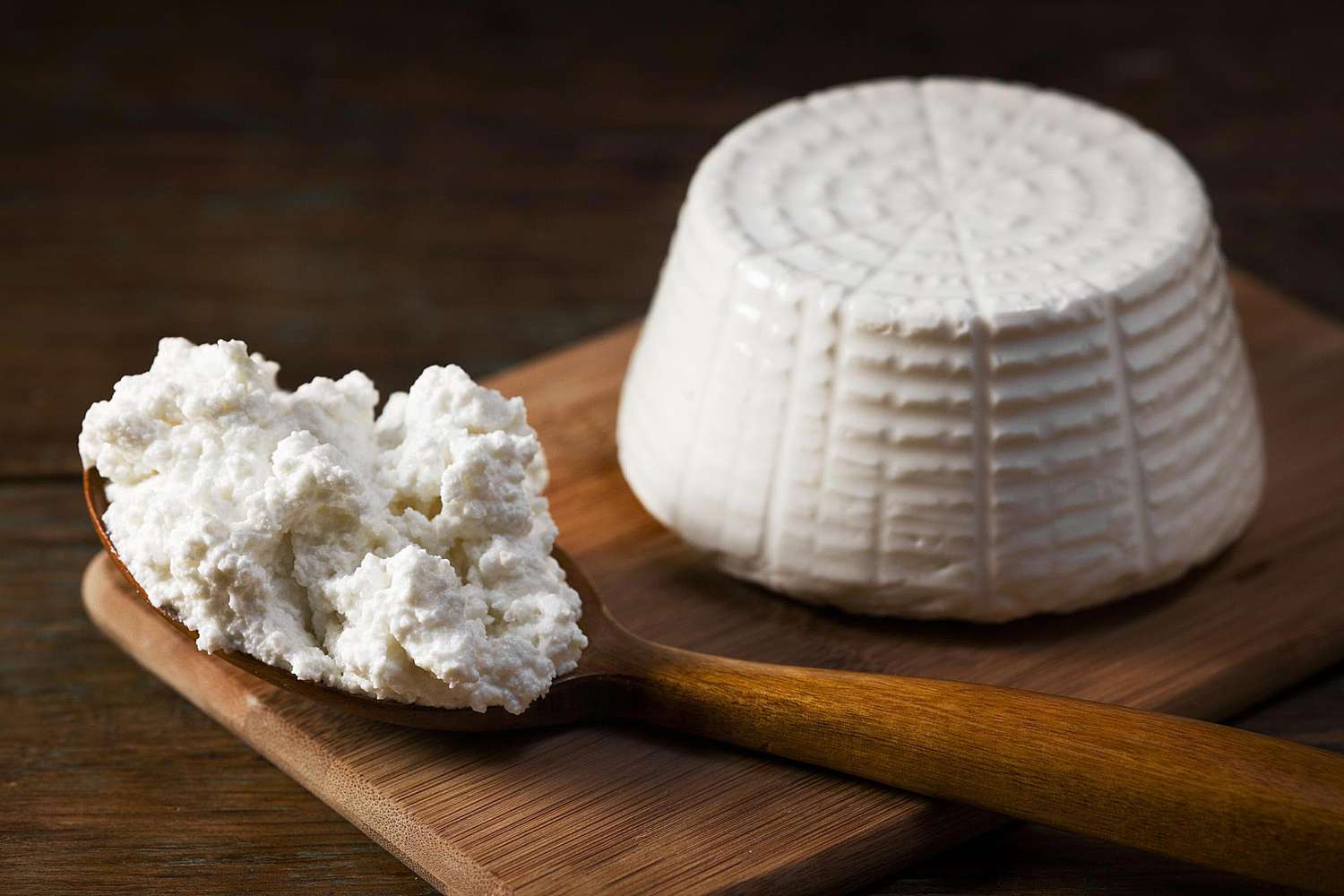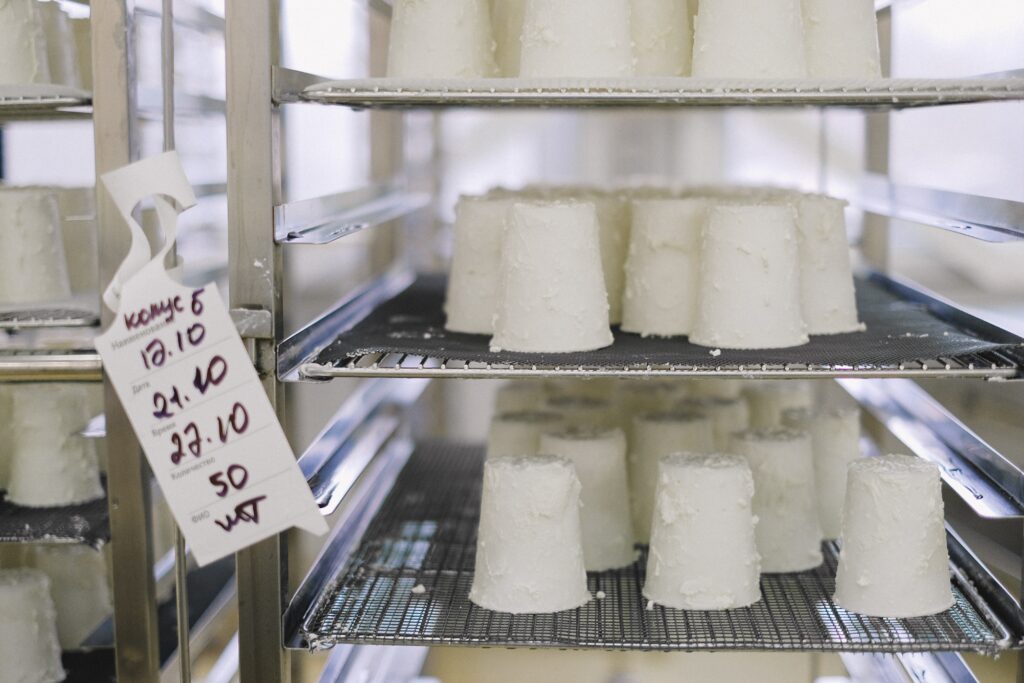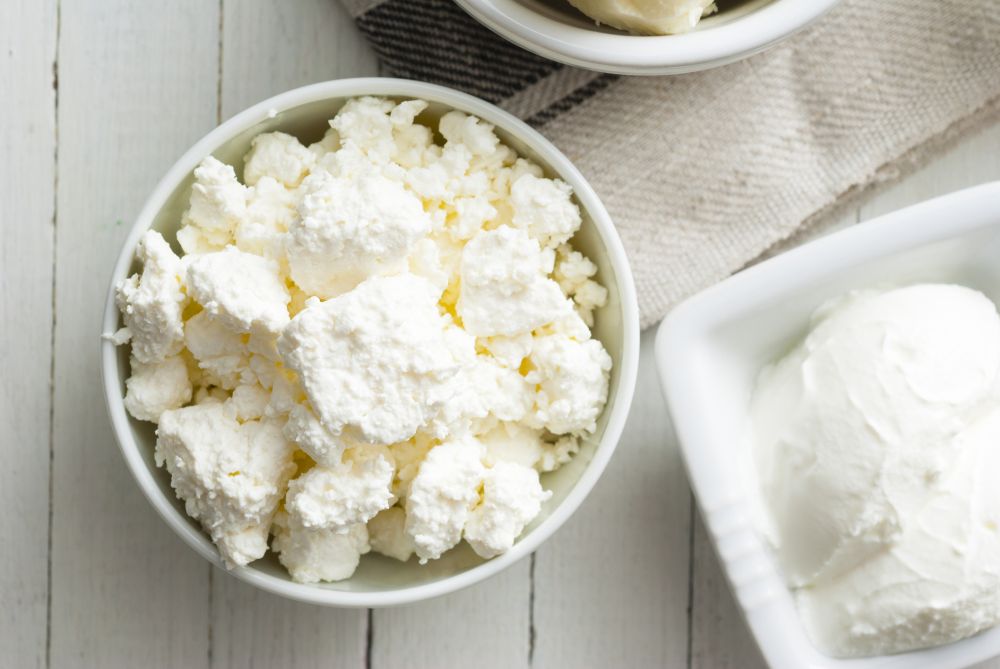Have you ever been in the middle of a cooking project, only to realize that you have nearly run out of one of your ingredients? It can be especially frustrating when it’s an essential ingredient like ricotta cheese. Instead of scurrying off to the store, maybe there is another solution: Can you freeze ricotta cheese for later use? Don’t worry if you don’t know the answer right away; this blog post is here to help. We’ll provide all the details so that next time you’re running low on cheeses or even dairy products, you can choose between a quick grocery trip and using your frozen stash. Read on to find out everything there is to know about freezing ricotta cheese.
Contents
What Is Ricotta Cheese?
Ricotta is a type of Italian cheese made from sheep or cow milk whey, which is the liquid that is leftover after the preparation of other cheeses. This mixture is then heated until it separates into two components: whey and ricotta curds. The whey is strained out, leaving behind creamy ricotta cheese with a slightly grainy texture. Ricotta is a versatile cheese that can be used in sweet and savory dishes such as lasagna, cannelloni, cheesecakes, and more.

How Is Ricotta Cheese Made?
Ricotta cheese is made by heating and curdling milk whey. The process starts with the preparation of other cheeses, like mozzarella or provolone. After the separation of curds and whey, the whey is heated until it reaches its boiling point, which causes the remaining proteins to coagulate into a soft mass. This mass is then strained through a cloth or cheesecloth to remove any extra liquid, leaving behind the ricotta curds. The curds are further drained and dried before they become ricotta cheese.
Before we dive into can you freeze ricotta cheese, let’s watch this video to know more about how is ricotta cheese made.
What Are The Different Types Of Ricotta Cheese?
Ricotta cheese comes in several varieties, including:
- Fresh ricotta is the most common type of ricotta. It has a mild flavor and can be used in both sweet and savory dishes.
- Mascarpone is an Italian cream cheese that has a rich, creamy texture and a slightly sweet taste. It is often used as a topping for desserts or in place of ricotta.
- Ricotta salata is a type of dry, aged ricotta cheese that has been pressed and salted. It has a salty flavor and crumbly texture, making it ideal as a topping for salads or pizzas.
- Whey ricotta is made from the liquid by-product of cheese production. It has a mild, slightly sweet flavor and is often used as an ingredient in savory dishes such as lasagna or manicotti.
Can You Freeze Ricotta Cheese?
The short answer to question “can you freeze ricotta cheese” is yes, you can freeze ricotta cheese. The best way to do this is to place it in an airtight container and store it in the freezer for up to three months. When you’re ready to use it, let the cheese thaw overnight in the refrigerator before using. Keep in mind that freezing ricotta cheese will alter its texture and flavor, so it may not be as smooth or creamy when it’s thawed. However, this shouldn’t affect the overall taste of your dish.

Why Do We Need To Know Can You Freeze Ricotta Cheese?
Knowing can you freeze ricotta cheese can come in handy for a variety of reasons. For one, it allows you to purchase larger quantities of the cheese at once and store it for later use when you need it. This is especially useful if you’re making a large batch of lasagna or other dish that requires ricotta cheese. It’s also helpful to have frozen ricotta on hand if you’re in a pinch and need an ingredient quickly. Lastly, freezing ricotta cheese can help extend its shelf life and reduce food waste.
Factor Affect To Freeze Ricotta Cheese
When freezing ricotta cheese, it’s important to keep in mind a few factors. First, be sure to always use an airtight container for storage. This will help prevent any moisture or bacteria from entering the cheese and causing it to spoil. Secondly, if you’re not using the entire package of ricotta cheese right away, break it into smaller portions before freezing. This will make it easier to thaw and use smaller amounts at a time without having to defrost the entire package. Lastly, be sure to freeze the ricotta cheese as soon as possible after you open it, as this will ensure that it stays fresh and flavorful for longer.

How To Freeze Ricotta Cheese?
Freezing ricotta cheese is actually quite simple! The most important aspect of freezing ricotta cheese is ensuring that it is tightly sealed before it goes into the freezer. This will help protect it from any freezer burn or other damage that could occur while in storage. To freeze ricotta cheese, start by portioning the cheese into usable amounts and transferring each portion to a resealable plastic bag. Squeeze out as much air from the bag as possible before sealing it tightly. Place the sealed bags of ricotta cheese in the freezer, and be sure to label them with the date you are freezing them.
How To Defrost Freezing Ricotta Cheese?
Defrosting ricotta cheese is just as easy as freezing it. Start by transferring the frozen ricotta to the refrigerator and allowing it to thaw overnight. The next day, remove the bag from the refrigerator and let it sit at room temperature for 15-20 minutes before using. If you’re in a hurry, you can also place the sealed bag of ricotta in a bowl of warm water to speed up the thawing process. If you plan on using the ricotta cheese in a cooked dish, be sure to cook it thoroughly so that any potential bacteria is destroyed.

Pros And Cons Of Freeze Ricotta Cheese
Freezing ricotta cheese has a few pros and cons that you should consider before deciding to freeze it. On the plus side, freezing ricotta cheese can help extend its shelf life and provide you with a convenient backup supply of the cheese. You’ll also be able to purchase larger amounts of the cheese at once and store them for later use.
On the downside, freezing ricotta cheese can alter its texture and flavor slightly, making it less creamy than fresh ricotta. Additionally, if you’re using frozen ricotta cheese in a cooked dish, be sure to cook it thoroughly so that any potential bacteria is destroyed.
Tips For Freezing Ricotta Cheese
When freezing ricotta cheese, there are a few tips you should keep in mind to ensure that it stays fresh and flavorful. First, be sure to always use an airtight container when storing the cheese, as this will help prevent any moisture or bacteria from entering the cheese and causing it to spoil. Secondly, portion the ricotta into smaller amounts before freezing so that you can thaw and use smaller quantities at a time without having to defrost the entire package. Lastly, be sure to freeze the ricotta cheese as soon as possible after you open it so that it stays fresh for longer.
What Are Appropriate Uses For Frozen Ricotta Cheese?
Frozen ricotta cheese can be used in place of fresh ricotta in many recipes. It works best when added to cooked dishes, here are a few of our favorite dishes featuring this Italian delicacy:
- Lasagna: Layer up lasagna noodles with ricotta cheese, pasta sauce, and your favorite fillings for an easy and delicious meal.
- Manicotti: Stuff manicotti shells with a mix of ricotta, mozzarella, Parmesan, parsley, and garlic for a classic Italian dish.
- Ricotta Pancakes: Combine ricotta cheese with eggs, flour, and sugar for a delicious breakfast.
- Ricotta Pie: This sweet Italian treat is made with ricotta cheese, sugar, heavy cream, and an assortment of spices.
- Ravioli: Stuff ravioli pockets with a mixture of ricotta, Parmesan cheese, and your favorite herbs and spices for a delicious dinner.
- Stuffed Shells: Stuff large pasta shells with ricotta, Parmesan, basil, and your favorite fillings for an easy weeknight dinner.
- Cheesecake Squares: Mix together ricotta cheese, cream cheese, sugar, and eggs and bake in a 9×9 inch pan for a delicious dessert.
- Cannoli: Combine ricotta cheese with confectioners’ sugar and chopped chocolate chips to make these classic Italian treats.
If you’re using frozen ricotta cheese for baked goods, be sure to thaw it overnight before adding it to the recipe. This will help ensure that it blends evenly and won’t affect the texture of the final dish.

Conclusion: Can You Freeze Ricotta Cheese?
Now you know the answer to the question “can you freeze ricotta cheese?” It’s simple and easy to do, so don’t be afraid to stock up on ricotta cheese and freeze it for later use. Just remember to thaw the frozen ricotta cheese overnight in the refrigerator before using it in your dishes. With a little planning, you can save time, reduce food waste, and enjoy delicious ricotta-based meals whenever you want. Thanks for reading at yongkangstreetnyc.com.
FAQs: Ricotta Cheese
Does freezing ricotta cheese change the texture?
Due to ricotta’s high moisture content, the freezing process causes the water within to solidify into ice, resulting in a change in texture. The ice separates the curds and whey, leading to a drier and more crumbly consistency.
Is it good to freeze ricotta cheese?
Freezing ricotta cheese is possible, but it may not always be the best option. While the flavor remains intact, the texture can become grainy after defrosting. This is due to the separation of water from the cheese curds, forming ice crystals during the freezing process.
Will freezing ricotta cheese impact its taste?
Freezing ricotta cheese may not significantly alter its flavor, but it can affect its texture. Therefore, it is recommended to use frozen ricotta cheese for melting rather than attempting to use it fresh in recipes.
Can you freeze ricotta cheese mixture for lasagna?
Absolutely! If you have prepared a delightful pasta filling with ricotta cheese, Parmesan cheese, eggs, and herbs, it is completely safe to freeze it. When you thaw it, you might need to drain any excess liquid, but otherwise, it will still be delicious.
Can you freeze ricotta with raw egg?
Yes, you can freeze ricotta cheese with raw egg. In fact, the egg will contribute to the texture and stability of the cheese when frozen. To do so, simply seal the ricotta and egg mixture in an airtight container and store in the freezer for a maximum of 2 months.
How long does ricotta cheese last in the refrigerator?
Discover the optimum lifespan for ricotta cheese in your refrigerator. By simply storing it in a tightly covered, original packaging or airtight container, you can extend its shelf life after opening. When refrigerated consistently, an opened package of ricotta cheese typically remains fresh for approximately two weeks.
Can ricotta cheese be melted when heated?
In short, ricotta cheese does not melt like other types of cheese. It falls into the same category as paneer, halloumi, queso blanco, and other cheeses that can be heated without melting. This is why ricotta cheese is a great option for dishes like lasagna, stuffed shells, ravioli, and cheesecake. It heats up beautifully, yet maintains its consistency without turning into a liquid mess.
Can you freeze ricotta cheese for baking?
Absolutely! Ricotta cheese is a fantastic ingredient to freeze, particularly if you plan on baking it in dishes like pasta or casseroles. You can even use frozen ricotta in delectable desserts like cannoli.
What does ricotta taste good on?
Discover the perfect pairing for the delightful taste of ricotta. This versatile cheese lends its mild flavor to a range of delectable treats, including pound cake, cheesecake, and pancakes. Boasting minimal fermentation, ricotta offers a delightful alternative to mascarpone with its lower fat content.
What is the texture of ricotta cheese?
Discover the texture of ricotta cheese: smooth yet slightly grainy. Experience its subtle sweetness. And explore the exceptional ricotta salata, aged for at least three months, boasting a texture reminiscent of feta.
Is ricotta cheese high in calories?
Discover the calorie content of ricotta cheese for a healthier lifestyle. With just 216 calories in a 1/2 cup portion, this delectable dairy delight is a fantastic choice for those aiming to shed pounds. Not only is ricotta low in calories, but it also packs a protein punch and supplies all nine essential amino acids your body craves. Embrace the goodness of ricotta cheese for a nourishing and weight-conscious diet.
What happens if you freeze ricotta cheese?
Discover the fascinating transformation when ricotta cheese meets freezing temperatures. Due to its abundant moisture, ricotta will undergo a remarkable textural shift as the water crystallizes into ice. Experience the intriguing evolution as the curds and whey separate, resulting in a delightful and satisfyingly crumbly cheese.
How long can you freeze ricotta cheese?
Learn how to store ricotta cheese effectively. Discover the optimal freezing time to maintain its quality. Freeze your ricotta for a maximum of 3 months to ensure its delicious flavor and creamy texture remain intact.

Chef Yong Kang has over 20 years of experience cooking in the finest restaurants, and is excited to present their vision to you and all our guests. Our caring and committed staff will ensure you have a fantastic experience with us.
We are also available for private events:, business lunches, dinners, and more. We would love to discuss how to be a part of your next event.Our restaurant refuses to compromise on quality, which is why we source our fresh ingredients from local farmers’ markets.










